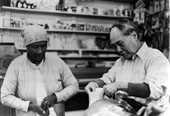"A two-hour immersion in the Mississippi Delta, creating, with no other exposition than is contained in images and the words of persons being interviewed, a rich documentary brew."
- Library Journal
"The finished film is peppered with moments that provide an unusual, but quite powerful critique of conventional film expectations with regard to ethnicity."
- Scott MacDonald, A Critical Cinema 3
"MISSISSIPPI TRIANGLE is a film in which acknowledgement of human complexity reveals an extraordinary world among Blacks, Chinese and Whites in the Mississippi Delta. It is moving and powerful because it is not heavy or dogmatic. People will like it, scholars will embrace it."
- Emile de Antonio, Filmmaker
"We see and hear for the first time, personal stories of Chinese families in the Mississippi Delta--their history and their experiences. We recognize people who are Southern and have never given up their deeply rooted Asian identity."
- Louise Lo, Programmer for the Asian American Programming Consortium, CPB
"The work of veteran filmmaker Christine Choy has often been concerned with revising our commonly and uncritically held views, most often with hard-hitting footage that simply marvels."
- All Movie Guide
"....ethnicity, acculturation, racism and interracial associations, poverty, social and economic change, community development and much more."
- Neil McMillen,, Univ. of Southern Mississippi
“MISSISSIPPI TRIANGLE deals with the American heartland, but not the heartland of waving fields of wheat and salt-of-the-earth white farmers. Instead it looks deep into the barren soul of U.S. racial relations… This is an important film of special-textural depth and lyrical toughness that challenges us to take a hard, honest look at ourselves.”
- John Kuo Wei Tchen, New York Chinatown History Project
"MISSISSIPPI TRIANGLE uncovers the socio-political and economic roots of interracial tension. This is a critical undertaking because it undermines the notion that racism is simply a question of attitude, or worse, of some ingrained, quasi-genetic antipathy ascribed to ‘human nature.’”
- Richard Fung, Seeing Yellow: Asian Identities in Film & Video
“The directorial team consisted of a Chinese American woman (Choy), a Black man (Worth Long) and a white man (Allan Siegel), and they all interview their own communities (brilliant), so there is some eyebrow-raising truth-telling going on… By deeming Asian Americans as part of the triangle, Choy carves out space for us to have our own voice and agency, and not just be a wedge group that's silenced or pitted against other groups.”
- Saturday School Podcast
“It is one of a plethora of works in film and art that show, contrary to popular perception, that the South has never had just two racial groups.”
- Imani Perry, The Atlantic
“A mosaic style of editing maintains the filmmakers' neutral theme--the triangle of inter-relatedness--but their use of three racially separate film crews to elicit dramatically honest responses carries its own message.”
- Pacific Film Arhives
